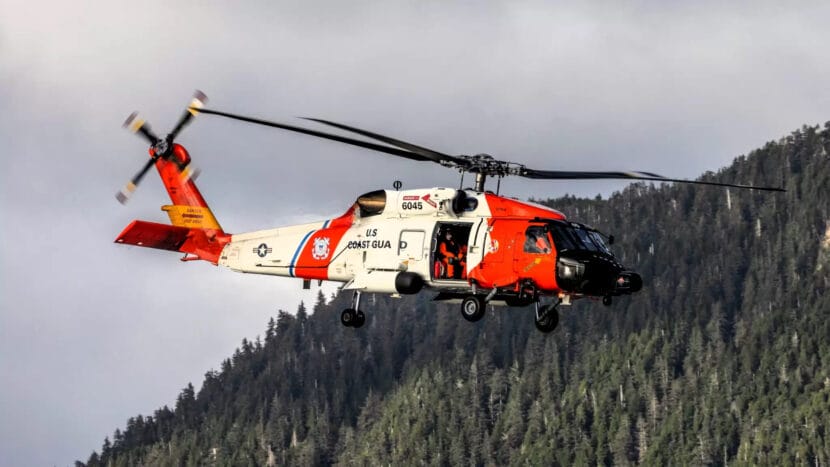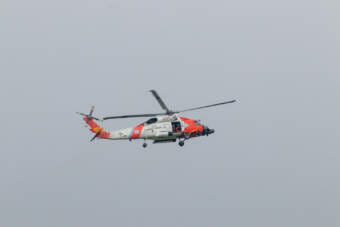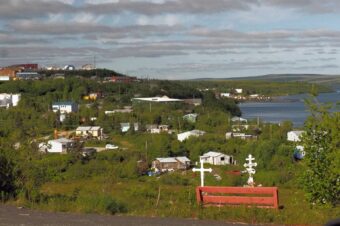
The first people at the scene of Monday night’s crash of an Air Station Sitka helicopter were the crew of the distressed fishing vessel it was sent to assist. The two brothers aboard the Lydia Marie played a critical role in the rescue of the downed air crew.
Logan Padgett is the captain of the Lydia Marie, a 44-foot wooden troller based in Wrangell. The Lydia Marie began taking on water around 8 p.m. Monday in the rough seas of Frederick Sound. Padgett sent out a mayday and steered for the protected northern shore of Read Island in Farragut Bay.
The helicopter launched from Air Station Sitka and made the 81-mile trip to Read Island by 10:15. Padgett spoke to the air crew by radio, letting them know that the flooding was under control.
Then something went wrong.
“Well, it was dark,” Padgett explained. “So we were just looking at the helicopter lights, and there wasn’t really much to see. But we could hear the rotors one second, and then (a) loud crash the next. Then silence.”
Padgett turned on the Lydia Marie’s crab lights. He and his younger brother rowed ashore and met one of the helicopter’s pilots on the beach, near where the aircraft had come to rest, inverted among some trees. Two members of the helicopter crew were pinned inside, and the brothers tried to keep them comfortable with sleeping bags and ibuprofen. And they used their own radios to help the crew call for help.
Petersburg Search and Rescue, EMS, police, Alaska Wildlife Troopers and more Coast Guard personnel answered their call.
Aaron Hankins is the director of Petersburg’s emergency services. He says the ride to Read Island was pretty treacherous — waves were nearly washing over the sides of the boat. And all the while, they were being pelted with snow and rain.
“We were kind of going with it on our way there and it was still pretty lumpy,” said Hankins. “It was pretty rough. At times, it was whiteout (conditions) on our way out there.”
Patrick Fowler leads Petersburg’s Search and Rescue team. He says when they reached the downed helicopter — a couple hours after the crash — they walked into a mess.
“(There was a) strong smell of fuel in the air, as could be expected,” said Fowler. “The helicopter was almost totally on its top side — totally upside down.”
The team was ready to render aid. But they didn’t have the right tools to immediately get the crew out of the fuselage. What they had with them might have been suitable to extract someone from a car accident — not a helicopter. But with time — and some brute force — they were able to free the injured crew.
”(It was) just a small space that’s gone topsy-turvy, and people kind of stuck and injured,” said Fowler. “It’s always a tricky environment to work in. And so yeah, cutting some straps, breaking a couple of pieces of metal and ultimately getting where we could transition them up and out of the helicopter.”
In spite of the challenges, Fowler said it was his favorite type of rescue mission.
“At the end of the day, everyone came home — and that’s why we do this,” said Fowler. “You see a direct correlation to your actions and a positive benefit to the people there that were in trouble. So that’s the most rewarding type of mission that we get.”
Back in Petersburg, Dr. Alice Hulebak was the physician on call that night. She says it was all hands on deck. Most of the hospital’s nurses and providers came out to lend a hand — even though they weren’t on call. Hulebak says the attending staff didn’t know what to expect — but they weren’t optimistic.
“There was a lot of unknown,” said Hulebak. “But (we were) sort of planning for, unfortunately, the worst. So that is why we essentially called in as much help as we could.”
Once the patients were stabilized, two nurses and a doctor accompanied the Coast Guard medevac flight to Seattle, because the Coast Guard didn’t have their own medevac team available at the time.
Mary Kravitz is Petersburg Medical Center’s nursing supervisor. She was on that flight, tending to the injured helicopter crew. She’s also the spouse of a Coast Guardsman. Kravitz says that connection made it very easy for her to volunteer her time.
“Thinking of my husband — it’s something that if I was in their shoes, and I couldn’t get to my husband in this sort of situation, I would hope that somebody would do the same for him,” said Kravitz.
Padgett, the captain of the fishing boat, says it did not feel strange coming to the aid of the Coast Guard.
“It’s just people helping people at that point,” he said.
Padgett says he knows nothing about helicopters, or what might have caused the accident. As a mariner, he does know the weather, and it was not a good night.
“I know that visibility was terrible,” he said. “And the gusts of wind were terrible. And it was just really bad flying conditions.”
In all, Padgett says he and his brother spent five or six hours on the beach at Read Island helping the air crew. Shortly after daybreak, the cutter Elderberry came to escort the Lydia Marie.
Asked if he’ll carry any particular memory of the events with him, Padgett said, “It was just kind of all one long, cold night.”
This story has been updated.



